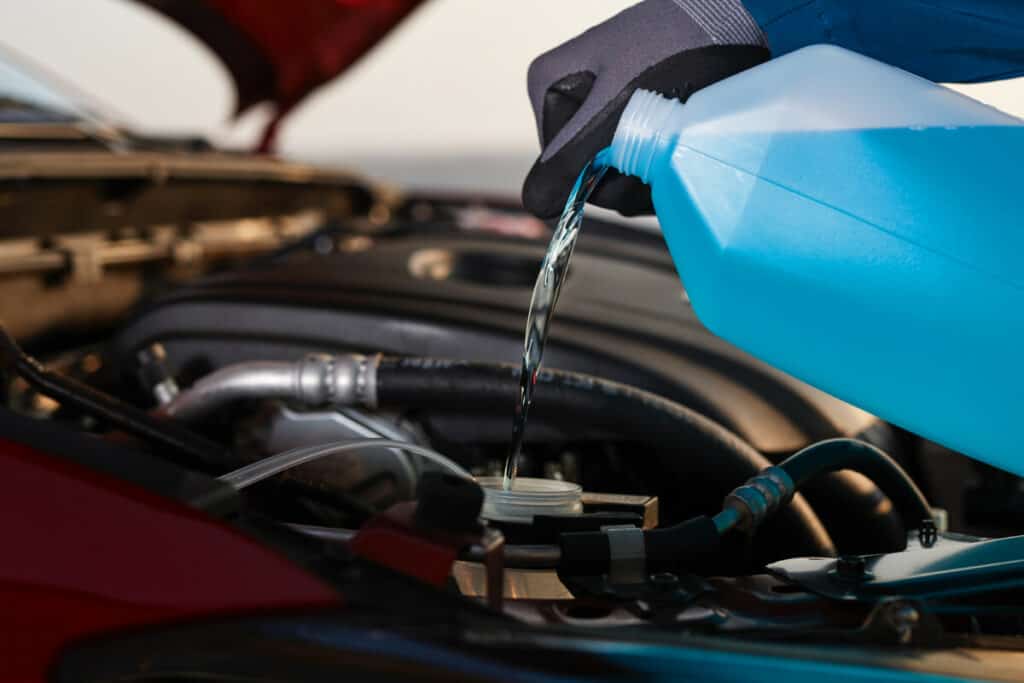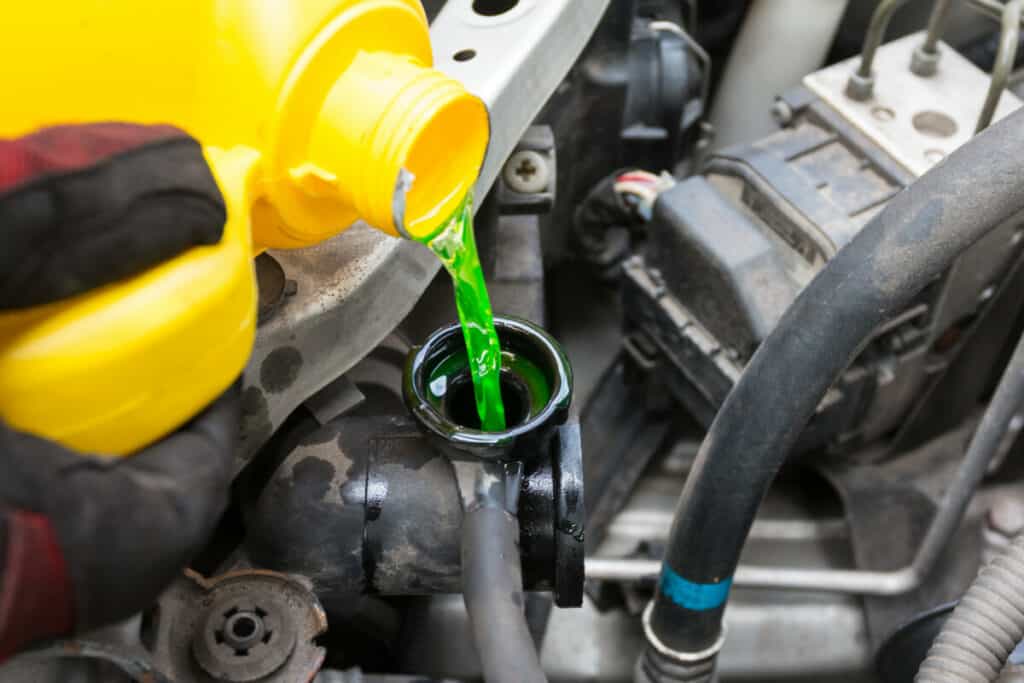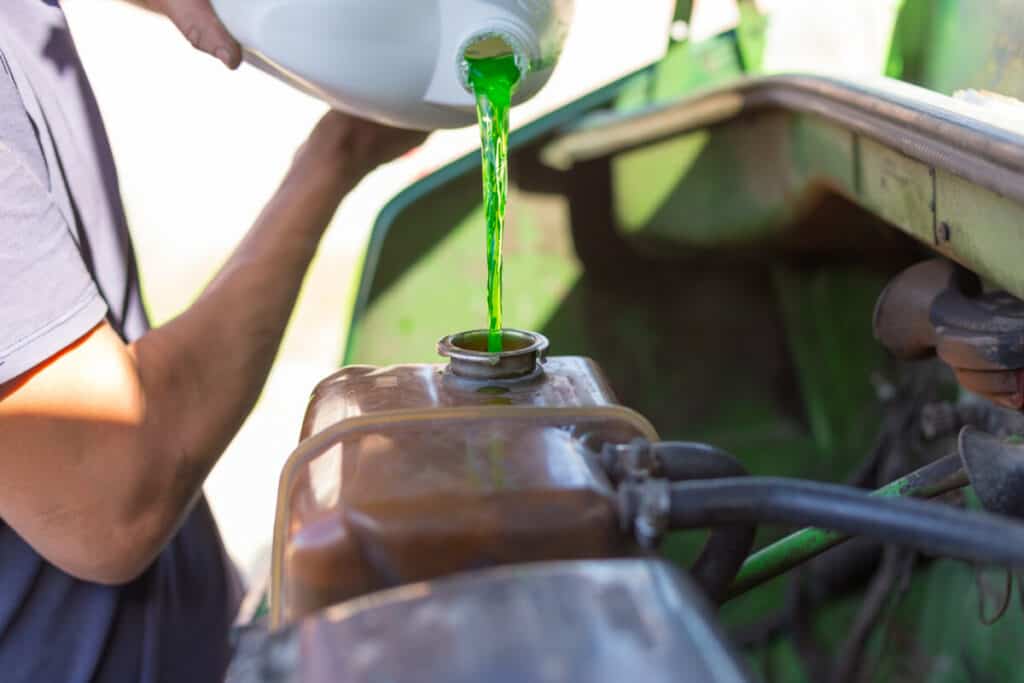
Antifreeze is something that anyone with a car may be familiar with. However, not everyone who has a car knows what exactly should be done with old antifreeze. So, what should be done with old antifreeze?
It is best to recycle any old antifreeze that has been used. This can be done by bringing it to a local recycling center, a service station, or an auto repair shop. Recycling spent antifreeze allows for it to be safely reused, however, it needs to be recycled by professionals.
Without doing research, it can be hard to know what exactly to do with used antifreeze. There are some things that are needed to be known before recycling or disposing of antifreeze. After doing research, some helpful tips and suggestions have been compiled below.
Recycling Antifreeze
Antifreeze can be recycled, even after it has already been used. To be able to recycle the antifreeze, it needs to be poured into a clean plastic gallon jug. It is extremely important that the gallon jug that the spent antifreeze is being poured into does not have any remaining liquids inside. (Source)
This jug of used or spent antifreeze can then be taken to a few different places. The first option is a local recycling center. Before taking antifreeze to your local recycling center, it is important to call and make sure that your center accepts antifreeze.
Used antifreeze can be taken to either service stations or auto repair shops to be recycled. The individuals working at these places are trained to handle spent antifreeze and are knowledgeable in how to recycle it. However, like recycling centers, not every service station or auto repair shop accepts used antifreeze. It is important to call before taking antifreeze in to make sure they accept it. (Source)
In some cases, antifreeze can contain particles that cause it to be considered hazardous. If this is the case, recycling your spent antifreeze might not be an option. Depending on your state there may or may not be an option to recycle hazardous antifreeze. Check this website from an EPA affiliate to see what the standards are for your particular state.
How to Know When Antifreeze is Spent
Spent antifreeze means that something has gotten into the antifreeze that has contaminated it. There are a few things that could contaminate the antifreeze such as other liquids used in cars like oil. (Source)
The antifreeze will have a change in color when it is spent, or no longer good. Spent antifreeze is a more common occurrence when individuals are doing at-home repairs to their vehicles than it is to occur at repair shops.
The antifreeze in your vehicle being a brown sludgy color is an indicator that the antifreeze is spent and needs to be changed.
Reasons to Change Antifreeze
It is important to change the antifreeze because coolant is needed to keep vehicles from overheating. When there isn’t enough coolant within a car, it is more likely to overheat which results in the car not running as it should. The antifreeze in a car should be checked and changed every thirty thousand miles to avoid any car issues down the road.

Things to Consider When Dealing with Antifreeze
When using antifreeze at home, it is important to make sure that is not being stored where it could potentially mix with any other liquid. Antifreeze that has been mixed with any other liquid is no longer able to be used as a coolant for vehicles and needs to be disposed of. Make sure that you store all of your chemicals in secure containers to prevent them from mixing with one another. If you are storing used antifreeze around your home make sure the container is kept on a tarp or a sealed concrete surface in case of any leaks.
It is also important to make sure that you are purchasing the correct antifreeze for your vehicle. Some types of vehicles require a specific type of antifreeze to effectively cool your vehicle.
Antifreeze should be regularly checked to ensure that the antifreeze in your vehicles is not spent or dangerous. Antifreeze should be checked at least two times a year, once before winter and the other during the summer. Antifreeze is intended to keep the temperature of your car engine stable so it will be under the most stress when the temperature rises or falls dramatically (summer/winter). If during one of these checks your antifreeze is spent or non-functional it needs to be disposed of.
Disposing of Antifreeze
If antifreeze is contaminated with traces of lead, it is not possible to recycle. When antifreeze contains lead, it is important to treat it as hazardous waste. Hazardous waste should not be treated the same as other trash you have around your home. Improperly disposing of hazardous waste is not only irresponsible, but it also may be a violation of local and national laws.
When disposing of hazardous waste, it is extremely important to follow local laws.
Many states require hazardous waste to be disposed of through the Household Hazardous Waste (HHW) facilities. This is the safest option to dispose of any waste that could be considered hazardous. (Source)

Things to Avoid when Disposing of Antifreeze
It is extremely important to never dispose of any antifreeze down the drain or by dumping it in the yard. Even if you water down antifreeze it is still not safe to put down a drain. The chemicals in it can cause damage to your home’s pipes and the chemicals could get into the local water supply. Most water treatment facilities are not equipped to remove antifreeze from the water supply.
Antifreeze also contains chemicals that are toxic to both humans and animals and it is important to avoid putting any animal at risk of consuming antifreeze. (Source) Never pour antifreeze in your yard, a ditch, or a sewer. The chemicals will linger longer than you expect and will remain toxic for years.
It is important to avoid directly touching antifreeze when changing it. This can be done by wearing gloves or being cautious when pouring it. When pouring antifreeze it is important that it avoids contact with your skin or eyes. Antifreeze has a high PH as well as contains some strong chemicals. If you aren’t careful while handling antifreeze and some of it gets on you or someone else you may be destined for an embarrassing hospital visit.
Related Topics:
If you like the article above, here are some other similar articles you should check out!
What Should I Do with Old Xbox Games
